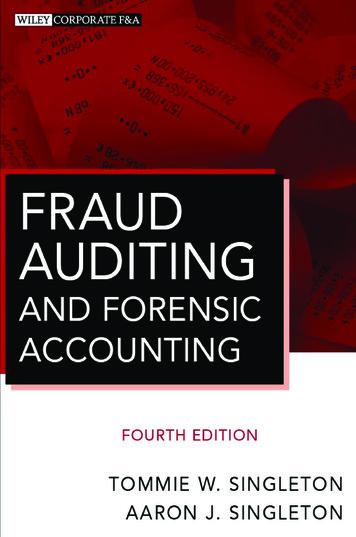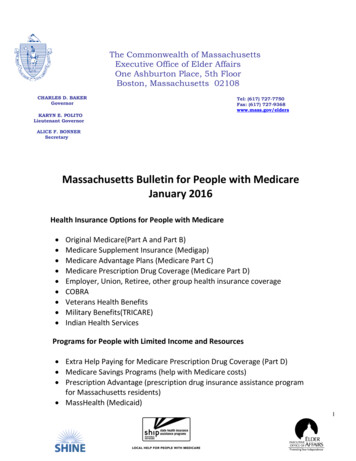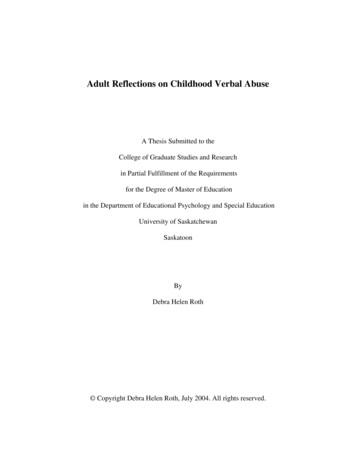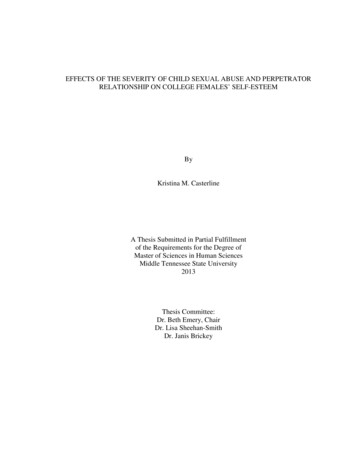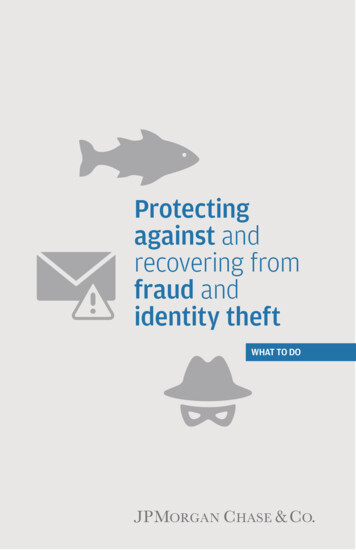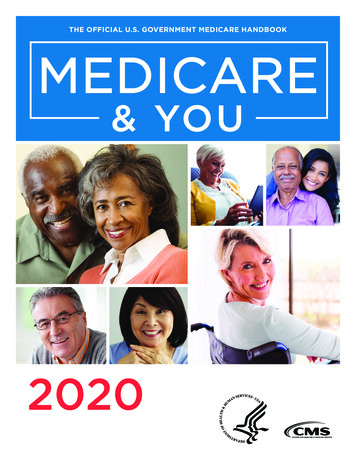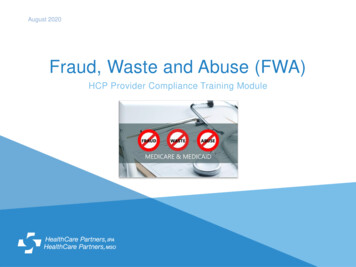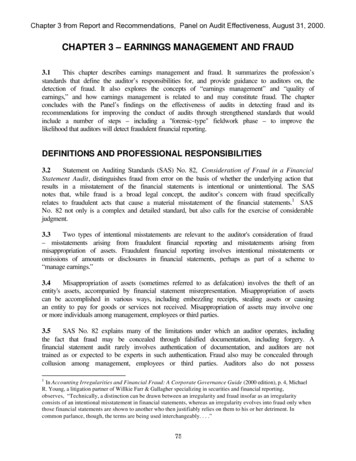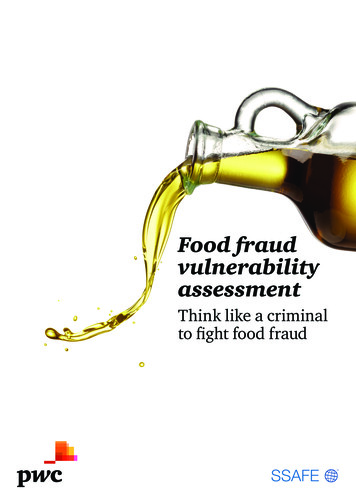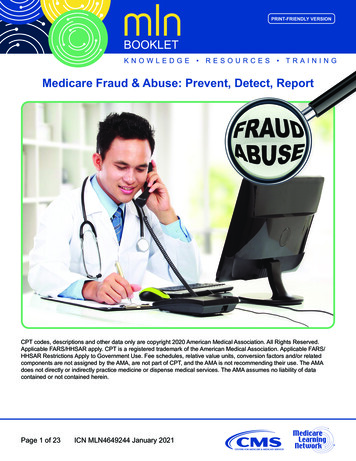
Transcription
PRINT-FRIENDLY VERSIONMedicare Fraud & Abuse: Prevent, Detect, ReportCPT codes, descriptions and other data only are copyright 2020 American Medical Association. All Rights Reserved.Applicable FARS/HHSAR apply. CPT is a registered trademark of the American Medical Association. Applicable FARS/HHSAR Restrictions Apply to Government Use. Fee schedules, relative value units, conversion factors and/or relatedcomponents are not assigned by the AMA, are not part of CPT, and the AMA is not recommending their use. The AMAdoes not directly or indirectly practice medicine or dispense medical services. The AMA assumes no liability of datacontained or not contained herein.Page 1 of 23ICN MLN4649244 January 2021
Medicare Fraud & Abuse: Prevent, Detect, ReportMLN BookletTable of ContentsUpdates . 4Medicare Fraud and Abuse: A Serious Problem That Needs Your Attention. 5What Is Medicare Fraud? . 6What Is Medicare Abuse? . 7Medicare Fraud and Abuse Laws . 8Federal Civil False Claims Act (FCA) . 8Anti-Kickback Statute (AKS) . 9Physician Self-Referral Law (Stark Law). 9Criminal Health Care Fraud Statute . 10Exclusion Statute . 10Civil Monetary Penalties Law (CMPL) .11Physician Relationships With Payers.11Accurate Coding and Billing .11Physician Documentation. 12Upcoding . 12Physician Relationships With Other Providers . 13Physician Investments in Health Care Business Ventures. 13Physician Recruitment . 14Physician Relationships With Vendors . 14Free Samples . 14Relationships With the Pharmaceutical and Medical Device Industries. 15Transparency in Physician-Industry Relationships . 15Federal Open Payments Program . 15Conflict-of-Interest Disclosures . 16Continuing Medical Education (CME) . 16Page 2 of 23ICN MLN4649244 January 2021
Medicare Fraud & Abuse: Prevent, Detect, ReportMLN BookletTable of Contents (cont.)Compliance Programs for Physicians . 17Medicare Anti-Fraud and Abuse Partnerships and Agencies . 17Health Care Fraud Prevention Partnership (HFPP) . 17Centers for Medicare & Medicaid Services (CMS). 18Office of the Inspector General (OIG) . 19Health Care Fraud Prevention and Enforcement Action Team (HEAT). 19General Services Administration (GSA) . 19Report Suspected Fraud . 20Where to Go for Help . 21Legal Counsel . 21Professional Organizations . 22CMS . 22OIG. 22What to Do if You Think You Have a Problem . 22OIG Provider Self-Disclosure Protocol. 22CMS Self-Referral Disclosure Protocol (SRDP). 23Resources . 23Page 3 of 23ICN MLN4649244 January 2021
Medicare Fraud & Abuse: Prevent, Detect, ReportUpdates Note: No substantiative content updates.Page 4 of 23ICN MLN4649244 January 2021MLN Booklet
Medicare Fraud & Abuse: Prevent, Detect, ReportMLN BookletMedicare Fraud and Abuse:A Serious Problem That Needs Your AttentionAlthough no precise measure of health care fraud exists, those who exploit Federal health careprograms can cost taxpayers billions of dollars while putting beneficiaries’ health and welfare at risk.The impact of these losses and risks magnifies as Medicare continues to serve a growing numberof beneficiaries.Most physicians try to work ethically, provide high-quality patient medical care, and submit properclaims. Trust is core to the physician-patient relationship. Medicare also places enormous trust inphysicians. Medicare and other Federal health care programs rely on physicians’ medical judgmentto treat patients with appropriate, medically necessary services, and to submit accurate claims forMedicare-covered health care items and services.You play a vital role in protecting the integrityof the Medicare Program. To combat fraudand abuse, you must know how to protect yourorganization from engaging in abusive practicesand violations of civil or criminal laws. This bookletprovides the following tools to help protect theMedicare Program, your patients, and yourself: Medicare fraud and abuse examples Overview of fraud and abuse lawsHelp Fight Fraud by Reporting ItThe Office of Inspector General (OIG)Hotline accepts tips and complaintsfrom all sources on potential fraud,waste, and abuse. View instructionalvideos about the OIG Hotline operations,as well as reporting fraud to the OIG. Government agencies and partnershipsdedicated to preventing, detecting, and fighting fraud and abuse Resources for reporting suspected fraud and abuseHealth care professionals who exploit Federal health care programs for illegal, personal, or corporategain create the need for laws that combat fraud and abuse and ensure appropriate, quality medical care.Physicians frequently encounter the following types of business relationships that may raise fraud andabuse concerns: Relationships with payers Relationships with fellow physicians and other providers Relationships with vendorsThese key relationships and other issues addressed in this booklet apply to all physicians, regardlessof specialty or practice setting.Page 5 of 23ICN MLN4649244 January 2021
Medicare Fraud & Abuse: Prevent, Detect, ReportMLN BookletWhat Is Medicare Fraud?Medicare fraud typically includes any of the following:Case Studies Knowingly submitting, or causing to be submitted, falseTo learn about real-life cases ofclaims or making misrepresentations of fact to obtain aMedicare fraud and abuse andFederal health care payment for which no entitlementthe consequences for culprits,would otherwise existvisit the Medicare Fraud Strike Knowingly soliciting, receiving, offering, or payingForce webpage.remuneration (e.g., kickbacks, bribes, or rebates) toinduce or reward referrals for items or servicesreimbursed by Federal health care programs Making prohibited referrals for certain designated health servicesAnyone can commit health care fraud. Fraud schemes range from solo ventures to widespreadactivities by an institution or group. Even organized crime groups infiltrate the Medicare Program andoperate as Medicare providers and suppliers. Examples of Medicare fraud include: Knowingly billing for services at a level of complexity higher than services actually provided ordocumented in the medical records Knowingly billing for services not furnished, supplies not provided, or both, including falsifyingrecords to show delivery of such items Knowingly ordering medically unnecessary items or services for patients Paying for referrals of Federal health care program beneficiaries Billing Medicare for appointments patients fail to keepDefrauding the Federal Government and its programs is illegal. Committing Medicare fraudexposes individuals or entities to potential criminal, civil, and administrative liability, and may lead toimprisonment, fines, and penalties.Criminal and civil penalties for Medicare fraud reflect the serious harms associated with healthcare fraud and the need for aggressive and appropriate intervention. Providers and health careorganizations involved in health care fraud risk being excluded from participating in all Federal healthcare programs and losing their professional licenses.Page 6 of 23ICN MLN4649244 January 2021
Medicare Fraud & Abuse: Prevent, Detect, ReportMLN BookletWhat Is Medicare Abuse?Abuse describes practices that may directly or indirectly result in unnecessary costs to the MedicareProgram. Abuse includes any practice that does not provide patients with medically necessaryservices or meet professionally recognized standards of care.The difference between “fraud” and “abuse” depends on specific facts, circumstances, intent,and knowledge.Examples of Medicare abuse include: Billing for unnecessary medical services Charging excessively for services or supplies Misusing codes on a claim, such as upcoding or unbundling codes. Upcoding is when a providerassigns an inaccurate billing code to a medical procedure or treatment to increase reimbursement.Medicare abuse can also expose providers to criminal and civil liability.Program integrity includes a range of activities targeting various causes of improper payments. Figure 1shows examples along the range of possible types of improper payments.Figure 1. Types of Improper Payments*MISTAKESINEFFICIENCIESBENDINGTHE RULESINTENTIONALDECEPTIONSRESULT IN ERRORS: Incorrectcoding that is not wide spreadRESULT IN WASTE:Ordering excessive diagnostic testsRESULTS IN ABUSE:Improper billing practices (like upcoding)RESULT IN FRAUD:Billing for services or supplies that were not provided*The types of improper payments in Figure 1 are strictly examples for educational purposes, and the precise characterizationof any type of improper payment depends on a full analysis of specific facts and circumstances. Providers who engagein incorrect coding, ordering excessive diagnostic tests, upcoding, or billing for services or supplies not provided may besubject to administrative, civil, or criminal liability.Page 7 of 23ICN MLN4649244 January 2021
Medicare Fraud & Abuse: Prevent, Detect, ReportMLN BookletMedicare Fraud and Abuse LawsFederal laws governing Medicare fraud and abuseinclude the: False Claims Act (FCA) Anti-Kickback Statute (AKS) Physician Self-Referral Law (Stark Law) Social Security Act, which includes the ExclusionStatute and the Civil Monetary Penalties Law (CMPL) United States Criminal CodeFraud and Abuse in MedicarePart C, Part D, and MedicaidIn addition to Medicare Part A andPart B, Medicare Part C and Part Dand Medicaid programs prohibit thefraudulent conduct addressed bythese laws.These laws specify the criminal, civil, and administrative penalties and remedies the government mayimpose on individuals or entities that commit fraud and abuse in the Medicare and Medicaid Programs.Violating these laws may result in nonpayment of claims, Civil Monetary Penalties (CMP), exclusionfrom all Federal health care programs, and criminal and civil liability.Government agencies, including the U.S. Department of Justice (DOJ), the U.S. Department ofHealth & Human Services (HHS), the HHS Office of Inspector General (OIG), and the Centers forMedicare and Medicaid Services (CMS), enforce these laws.Federal Civil False Claims Act (FCA)The civil FCA, 31 United States Code (U.S.C.) Sections 3729–3733, protects the Federal Governmentfrom being overcharged or sold substandard goods or services. The civil FCA imposes civil liability onany person who knowingly submits, or causes the submission of, a false or fraudulent claim to theFederal Government.The terms “knowing” and “knowingly” mean a person has actual knowledge of the information or actsin deliberate ignorance or reckless disregard of the truth or falsity of the information related to the claim.No specific intent to defraud is required to violate the civil FCA.Examples: A physician knowingly submits claims to Medicare for medical services not provided or fora higher level of medical services than actually provided.Penalties: Civil penalties for violating the civil FCA may include recovery of up to three times theamount of damages sustained by the Government as a result of the false claims, plus financialpenalties per false claim filed.Additionally, under the criminal FCA, 18 U.S.C. Section 287, individuals or entities may face criminalpenalties for submitting false, fictitious, or fraudulent claims, including fines, imprisonment, or both.Page 8 of 23ICN MLN4649244 January 2021
Medicare Fraud & Abuse: Prevent, Detect, ReportMLN BookletAnti-Kickback Statute (AKS)The AKS, 42 U.S.C. Section 1320a-7b(b), makes it a crimeto knowingly and willfully offer, pay, solicit, or receive anyremuneration directly or indirectly to induce or reward patientreferrals or the generation of business involving any itemor service reimbursable by a Federal health care program.When a provider offers, pays, solicits, or receives unlawfulremuneration, the provider violates the AKS.Anti-KickbackStatute vs. Stark LawRefer to the Comparison of theAnti-Kickback Statute and StarkLaw handout.NOTE: Remuneration includes anything of value, such as cash, free rent, expensive hotel stays andmeals, and excessive compensation for medical directorships or consultancies.Example: A provider receives cash or below-fair-market-value rent for medical office space inexchange for referrals.Penalties: Criminal penalties and administrative sanctions for violating the AKS may include fines,imprisonment, and exclusion from participation in the Federal health care program. Under the CMPL,penalties for violating the AKS may include three times the amount of the kickback.The “safe harbor” regulations, 42 Code of Federal Regulations (C.F.R.) Section 1001.952, describevarious payment and business practices that, although they potentially implicate the AKS, are nottreated as offenses under the AKS if they meet certain requirements specified in the regulations.Individuals and entities remain responsible for complying with all other laws, regulations, andguidance that apply to their businesses.Physician Self-Referral Law (Stark Law)The Physician Self-Referral Law, 42 U.S.C. Section 1395nn, often called the Stark Law, prohibitsa physician from referring patients to receive “designated health services” payable by Medicare orMedicaid to an entity with which the physician or a member of the physician’s immediate family has afinancial relationship, unless an exception applies.Example: A physician refers a beneficiary for a designated health service to a clinic where thephysician has an investment interest.Penalties: Penalties for physicians who violate the Stark Law may include fines, CMPs for each service,repayment of claims, and potential exclusion from participation in the Federal health care programs.Page 9 of 23ICN MLN4649244 January 2021
Medicare Fraud & Abuse: Prevent, Detect, ReportMLN BookletCriminal Health Care Fraud StatuteThe Criminal Health Care Fraud Statute, 18 U.S.C. Section 1347 prohibits knowingly and willfullyexecuting, or attempting to execute, a scheme or lie in connection with the delivery of, or payment for,health care benefits, items, or services to either: Defraud any health care benefit program Obtain (by means of false or fraudulent pretenses, representations, or promises) any of the moneyor property owned by, or under the control of, any health care benefit programExample: Several doctors and medical clinics conspire in a coordinated scheme to defraud theMedicare Program by submitting medically unnecessary claims for power wheelchairs.Penalties: Penalties for violating the Criminal Health Care Fraud Statute may include fines,imprisonment, or both.Exclusion StatuteThe Exclusion Statute, 42 U.S.C. Section 1320a-7, requires the OIG to exclude individuals and entitiesconvicted of any of the following offenses from participation in all Federal health care programs: Medicare or Medicaid fraud, as well as any other offenses related to the delivery of items orservices under Medicare or Medicaid Patient abuse or neglect Felony convictions for other health care-related fraud, theft, or other financial misconduct Felony convictions for unlawful manufacture, distribution, prescription, or dispensingcontrolled substancesThe OIG also may impose permissive exclusions on other grounds, including: Misdemeanor convictions related to health care fraud other than Medicare or Medicaid fraud, ormisdemeanor convictions for unlawfully manufacturing, distributing, prescribing, or dispensingcontrolled substances Suspension, revocation, or surrender of a license to provide health care for reasons bearing onprofessional competence, professional performance, or financial integrity Providing unnecessary or substandard services Submitting false or fraudulent claims to a Federal health care program Engaging in unlawful kickback arrangements Defaulting on health education loan or scholarship obligationsPage 10 of 23ICN MLN4649244 January 2021
Medicare Fraud & Abuse: Prevent, Detect, ReportMLN BookletExcluded providers may not participate in the Federal health care programs for a designated period.If you are excluded by OIG, then Federal health care programs, including Medicare and Medicaid,will not pay for items or services that you furnish, order, or prescribe. Excluded providers may not billdirectly for treating Medicare and Medicaid patients, and an employer or a group practice may notbill for an excluded provider’s services. At the end of an exclusion period, an excluded provider mustseek reinstatement; reinstatement is not automatic.The OIG maintains a list of excluded parties called the List of Excluded Individuals/Entities (LEIE).Civil Monetary Penalties Law (CMPL)The CMPL, 42 U.S.C. Section 1320a-7a, authorizes OIG to seek CMPs and sometimes exclusion fora variety of health care fraud violations. Different amounts of penalties and assessments apply basedon the type of violation. CMPs also may include an assessment of up to three times the amountclaimed for each item or service, or up to three times the amount of remuneration offered, paid,solicited, or received. Violations that may justify CMPs include: Presenting a claim you know, or should know, is for an item or service not provided as claimed orthat is false and fraudulent Violating the AKS Making false statements or misrepresentations on applications or contracts to participate in theFederal health care programsCMP Inflation AdjustmentEach year, the Federal Government adjusts all CMPs for inflation. The adjusted amounts apply tocivil penalties assessed after August 1, 2016, and violations after November 2, 2015. Refer to45 C.F.R. Section 102.3 for the yearly inflation adjustments.Physician Relationships With PayersThe U.S. health care system relies heavily on third-party payers to pay the majority of medical bills onbehalf of patients. When the Federal Government covers items or services rendered to Medicareand Medicaid beneficiaries, the Federal fraud and abuse laws apply. Many similar State fraud andabuse laws apply to your provision of care under state-financed programs and to private-pay patients.Accurate Coding and BillingAs a physician, payers trust you to provide medically necessary, cost-effective, quality care. You exertsignificant influence over what services your patients get. You control the documentation describingservices they receive, and your documentation serves as the basis for claims you submit. Generally,Medicare pays claims based solely on your representations in the claims documents.Page 11 of 23ICN MLN4649244 January 2021
Medicare Fraud & Abuse: Prevent, Detect, ReportMLN BookletWhen you submit a claim for services provided to a Medicare beneficiary, you are filing a billwith the Federal government and certifying you earned the payment requested and compliedwith the billing requirements. If you knew or should have known the submitted claim was false,then the attempt to collect payment is illegal. Examples of improper claims include: Billing codes that reflect a more severe illness than actually existed or a more expensive treatmentthan was provided Billing medically unnecessary services Billing services not provided Billing services performed by an improperly supervised or unqualified employee Billing services performed by an employee excluded from participation in the Federal healthcare programs Billing services of such low quality they are virtually worthless Billing separately for services already included in a global fee, like billing an evaluation andmanagement service the day after surgeryPhysician DocumentationMaintain accurate and complete medical records and documentation of the services you provide.Ensure your documentation supports the claims you submit for payment. Good documentationpractices help to ensure your patients get appropriate care and allow other providers to relyon your records for patients’ medical histories.The Medicare Program may review beneficiaries’ medical records. Good documentation helpsaddress any challenges raised about the integrity of your claims. You may have heard the sayingregarding malpractice litigation: “If you didn’t document it, it’s the same as if you didn’t do it.” Thesame can be said for Medicare billing.Accuracy of Medical Record DocumentationFor more information on physician documentation, refer to the Evaluation and ManagementServices guide, Complying With Medical Record Documentation Requirements fact sheet, andan OIG video on the Importance of Documentation.UpcodingMedicare pays for many physician services using Evaluation and Management (E/M) codes. Newpatient visits generally require more time than established patient follow-up visits. Medicare pays newpatient E/M codes at higher reimbursement rates than established patient E/M codes.Example: Billing an established patient follow-up visit using a higher-level E/M code, such as acomprehensive new-patient office visit.Page 12 of 23ICN MLN4649244 January 2021
Medicare Fraud & Abuse: Prevent, Detect, ReportMLN BookletAnother example of E/M upcoding is misusing modifier –25. Modifier –25 allows additional paymentfor a significant, separately identifiable E/M service provided on the same day of a procedure orother service. Upcoding occurs when a provider uses modifier –25 to claim payment for a medicallyunnecessary E/M service, an E/M service not distinctly separate from the procedure or other serviceprovided, or an E/M service not above and beyond the care usually associated with the procedure.Physician Relationships With Other ProvidersAnytime a health care business offers you something for free or below fair market value, askyourself, “Why?”Physician Investments in Health Care Business VenturesSome physicians who invest in health care businessventures with outside parties (for instance, imaging centers,laboratories, equipment vendors, or physical therapy clinics)refer more patients for the services provided by thoseparties than physicians who do not invest. These businessrelationships may improperly influence or distort physiciandecision-making and result in the improper steering ofpatients to a therapy or service where a physician has afinancial interest.Excessive and medically unnecessary referrals wasteFederal Government resources and can exposeMedicare beneficiaries to harm from unnecessaryservices. Many of these investment relationships haveserious legal risks under the AKS and Stark Law.Physician InvestmentsFor more information on physicianinvestments, refer to the OIG’s: Special Fraud Alert:Joint Venture Arrangements Special Fraud Alert:Physician-Owned Entities Special Advisory Bulletin:Contractual Joint VenturesIf someone invites you to invest in a health care business whose products you might order or to whichyou might refer your patients, ask yourself the following questions. If you answer “yes” to any of them,you should carefully consider the reasons for your investment. Is the investment interest offered to you in exchange for a nominal capital contribution? Is the ownership share offered to you larger than your share of the aggregate capital contributionsmade to the venture? Is the venture promising you high rates of return for little or no financial risk? Is the venture, or any potential business partner, offering to loan you the money to make yourcapital contribution?CPT only copyright 2020 American Medical Association. All rights reserved.Page 13 of 23ICN MLN4649244 January 2021
Medicare Fraud & Abuse: Prevent, Detect, ReportMLN Booklet Are you promising or guaranteeing to refer patients or order items or services from the venture? Are you more likely to refer patients for the items and services provided by the venture if you makethe investment? Does the venture have sufficient capital from other sources to fund its operations?Physician RecruitmentHospitals and other health systems may provide a physician-recruitment incentive to induce you torelocate to the hospital’s geographic area, join its medical staff, and establish a practice to help serve acommunity’s medical needs. Often, such recruitment efforts fill a legitimate “clinical gap” in a medicallyunderserved area where attracting physicians may be difficult in the absence of financial incentives.However, in some communities, especially ones with multiple hospitals, hospitals fiercely competefor patients. To gain referrals, some hospitals may offer illegal incentives to you or to the establishedphysician practice you join in the hospital’s community. This means the competition for your loyaltycan cross the line into an illegal arrangement with legal consequences for you and the hospital.A hospital may pay you a fair market-value salary as an employee or pay you fair market value forspecific services you render to the hospital as an independent contractor. However, the hospital maynot offer you money, provide you free or below-market rent for your medical office, or engage insimilar activities designed to influence your referral decisions. Admit your patients to the hospitalbest suited to care for their medical conditions or to the hospital your patients select based ontheir preference or insurance coverage.Within very specific parameters of the Stark Law and subject to compliance with the AKS, hospitalsmay provide relocation assistance and practice support under a properly structured recruitmentarrangement to assist you in establishing a practice in the hospital’s community. If a hospital orphysician practice separately or jointly recruit you as a new physician to the community, they mayoffer a recruitment package. Unless you are a hospital employee, you cannot negotiate for benefitsin exchange for an implicit or explicit promise to admit your patients to a specific hospital or practicesetting. Seek knowledgeable legal counsel if a prospective business relationship requires you toadmit patients to a specific hospital or practice group.Physician Relationships With VendorsFree SamplesMany drug and biologic companies provide free product samples to physicians. It is legal to givethese samples to your patients fre
Medicare Learning Network website . Medicare Fraud & Abuse: Prevent, Detect, Report. MLN Booklet Page 2 of 23 ICN MLN4649244 January 2021. Table of Contents.
